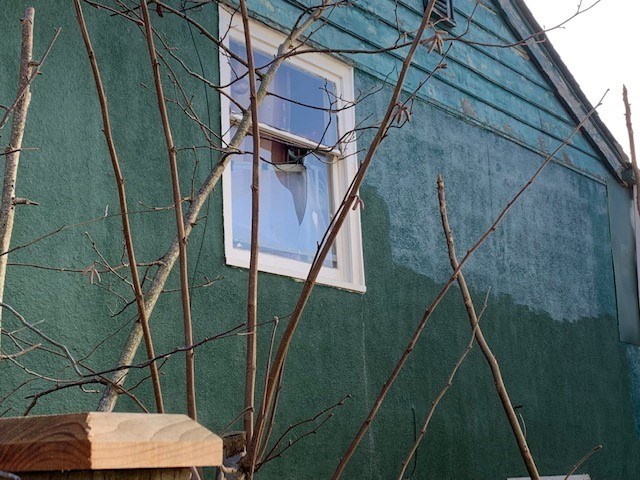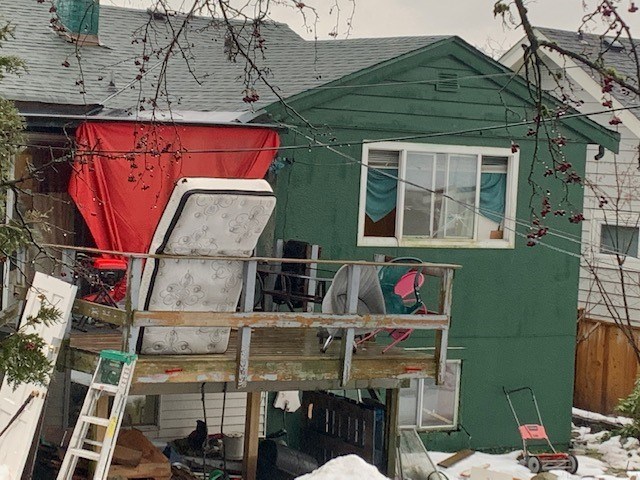Susan Wheeler and her family have lived in a quiet Grand Boulevard neighbourhood, close to Ridgeway Elementary, for more than two decades.
Her kids have grown up here and it’s a neighbourhood she loves.
Lately, however, Wheeler says the thought of moving has been crossing her mind more often, thanks to activities at the rental home across from her in the 400-block of 11th Street. That has included everything from loud parties that often end in ugly fights, fires in the backyard, open drug deals in the street and a near-constant stream of strangers going in and out. Garbage has piled up at the back of the house, and both police and the fire department are a constant presence, said Wheeler.
'It's like living in a war zone'
“There’s always flashing lights and something going on,” she said. “It’s like living in a war zone.”
Neighbours says they’ve seen police entering the home with guns drawn, and an incident where one person from the house brandishing a machete chased another person down the street. On occasion the B.C. Coroner's Service has visited.
“We feel very unsafe in this neighbourhood,” said Wheeler, who says the situation has become much worse over the past year.
Mike Perley, another neighbour, has observed similar problems, including tipped-over garbage cans, shopping buggies and mattresses piled up outside.
Perley said he’s always had a respectful relationship with the tenants over the years, many of whom have had substance use or mental health problems.
Tenants tell neighbours house isn't safe
A number of tenants have told him conditions in the house have not been safe, said Perley.
Recently, Perley said he had a chance to see for himself when the owner invited him in to take a look inside, where he saw broken windows, a hot water heater that appeared to be hooked up to a propane tank, stairs that had been moved, a disconnected dryer vent, and hotplates plugged in haphazardly to a nest of electrical cords.
Authorities need to do more to deal with conditions that have developed on the property, say both Wheeler and Perley.
Neighbours have met with police, the city’s bylaw enforcement office, and even the longtime owner of the property, who lives in Lynn Valley, and who maintains she has little control over what happens at the house
City is investigating complaints
Paul Duffy, manager of bylaw enforcement for the City of North Vancouver, said the house is well-known to his department, and has been the subject of numerous complaints about fires, noise, garbage, and unpermitted alterations. Those complaints are being investigated, said Duffy.
Duffy said while he understands the frustrations of the neighbours, nailing down the problems and who is responsible is not always straightforward.
“There’s steps and obligations the city has to meet,” he said. “It’s not as easy as putting a sticker on the house and condemning it.”
Property records indicate the rooming house is owned by Celine Goh, who lives on Kirkstone Road in North Vancouver. According to B.C. Assessment, the property is assessed at almost $1.85 million, although the house itself is valued at less than $33,000.

Owner says she's not responsible for tenants' actions
Speaking to the North Shore News, Goh said she has owned the property since the 1980s and rents out rooms to provide an investment income in her old age. Goh said there are five or six official tenants, but others frequently show up and end up squatting there. Goh added she has no control over activities by tenants that have resulted in complaints, or unauthorized changes made inside the house. She said she’s been handed thousands of dollars in tickets by the city and is now in the process of trying to evict her tenants, but is having trouble getting them to leave. “Enough is enough,” she said.
Outreach workers worry that in solving some problems, others are being created.
While the house has no official status as a recovery house or supported living home, outreach workers do provide food and supplies to some clients who live in the house, said Julia Kaisla, executive director of the Canadian Mental Health Association's North Shore branch. She acknowledges it’s not an ideal situation.
'Profound lack' of housing options
There is a “profound lack of options” for people experiencing precarious housing on the North Shore, especially those with substance use issues and complex health challenges, she said.
Agencies like the mental health association would prefer to see more housing options, including low-barrier harm-reduction housing, as well as a "Circle of Care" model – where social service agencies themselves rent out houses while providing supports to tenants in partnership with other groups like faith communities. Already that is being tried at three different homes on the North Shore, supporting 16 individuals, said Kaisla, and that has been successful.
Currently, the mental health association is applying for funding to expand the program on the North Shore. “There’s a gap there we’re hoping to address,” she said.
Until that happens, however, unofficial rooming houses like the one on East 11th street are among the few options available to many people with complex needs and limited incomes.
Housing advocates worried
If that gets shut down, without an alternative in place, those people are likely to become homeless or to simply move to another rooming house, said CMHA outreach manager Sandra Vasquez. That appears to be what’s now happening, as several people in the house have been handed eviction notices, said Vasquez.
Vasquez says she feels the owner has taken advantage of vulnerable people, who are now being cast out with nowhere to go. Some may go to the North Shore shelter but others will likely end up living in tents in the bush, she said.
Neighbours of the house say they have no quarrel with supportive housing. One such house exists nearby, said Wheeler, and has never been a problem. “It’s clean. It’s managed.”
The house on East 11th Street is different, she says, and one that the immediate neighbours shouldn’t have to live with, and report to authorities for months and years on end. “It’s not safe for the neighbourhood. [The owner] runs it like a slum,” she said. “It exploits everybody involved.”





